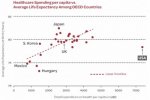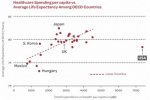- Joined
- Jul 1, 2011
- Messages
- 92,068
- Reaction score
- 91,097
- Gender
- Male
- Political Leaning
- Independent
Thanks.. been there seen that.
Now. here is something for you to look at:
One-third of Americans -- or 78.6 million -- are classified as obese according to a paper published in 2014 in The Journal of the American Medical Association.
The average rate of obesity across Europe is one in six adults
Gee Helix could having DOUBLE the obesity rate of Europeans, and the resulting complication be the main factor in our costs?
Any objective person would realize that. but not you.. of course not.. its our system.. why it has to be.. even though there is wide variations within countries with the same system.
What about stress and work hours? any difference there?
America can learn from Europe on work-life balance - CNN.com
Gee what does working hours/stress have on health.
Forbes Welcome
How about a sedentary lifestyle?
Could that be contributing to our healthcare costs?
Of course not.. its got to be a system right Helix?
Come on.. be objective for once.
yes, because you've been the absolute image of objectivity during these past fifty threads, lol. have you considered for a moment that many people might actually be avoiding preventative care and regular checkups because of the potential cost? that they only get treatment when they have to for the same reason? my guess is that it hasn't, because you don't seem to live in that world. and, once again, it's job and location dependent. some people might have the whole thing covered. some might have insurance that is pretty much worthless. that's a dumb system, considering that we have to pay for primary care at emergency rooms once the illness becomes situation critical.
either way, we've been over all of this before five hundred times, so it's pointless by now. believe whatever you like.


